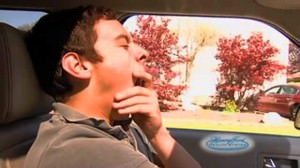

- It is practically impossible to test drowsiness especially when the person is not under the influence of drugs.
- Police are not well trained on how to determine or point out drowsiness as a cause of accident.
- It is not expected for drivers to self-report or confess to be drowsy.
- It is not possible to differentiate drowsiness from fatigue after an accident has occurred.
Even with the above challenges, estimates show that about 10-30% of accidents are a result of drowsy driving.
According to a poll done by the National Sleep Foundation, 60% of American drivers confess to have driven while sleepy. Even worse, 37% confess to have fallen asleep while driving. Majority of those interviewed could not tell whether they were asleep or drowsy driving.
Drowsy Driving: Symptoms
- Poor concentration that leads to constant blinking.
- Heavy eyelids.
- Daydreaming.
- Memory problems I.e. you cannot remember how long you have driven.
- Constant yawning.
- Missing traffic signs.
- Difficulty in keeping your head up.
- Moving away from your lane regularly.
- Restlessness.
The above symptoms can be used by third-parties to determine whether a driver is drowsy. As a passenger or a friend, it is in your interest to not allow drowsy driving. Conservative figures from National Highway Traffic Safety Administration show that 100,000 crashes are caused by fatigue and sleepy driving every year. This results in about 1500 deaths and over 71,000 injuries. The loss caused in by drowsy driving in terms of money translates into $ 12.5 billion.
Who is at risk of Drowsy Driving?
- Drowsy driving is reported more in men than women. Men are also twice at risk of falling asleep while driving.
- Parents are at a higher risk of sleepy driving than childless adults.
- Young adults between the ages of 18- 29 sleepy driving more than other age groups.
- Drowsy drive is reported more among shift workers than those working in 9 to 5.
- Those sleeping for less than 5 hour per night are at a higher risk of drive drowsy. Fewer cases of sleepy driving are reported among those sleeping for at least 8 hours a night.
Blood Alcohol Concentration (BAC) of 0.08 is considered legally drunk. Poor sleep of up to 18 hours produces impairments than are equal to BAC 0.05. If the case of poor sleep is extended for 4 more hours, the impairment produced is equal to 0.1 BAC.
How to Avoid Drowsy Driving
- Ensure you have a driving partner when taking long drives.
- Drink a caffeinated drink to keep you alert.
- Ensure than the car temperature is set at cool. Better still, roll down the windows.
- Pullover at a motel every so often and take a nap.
- Sleep for about 8 hours everyday.
- Be alert to identify the signs of drive drowsy and do not ignore them.
- Be ready to DIE if you ignore the signs of dozy driving.
